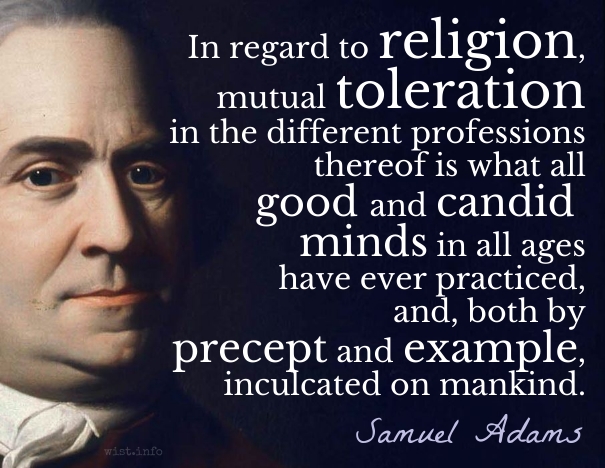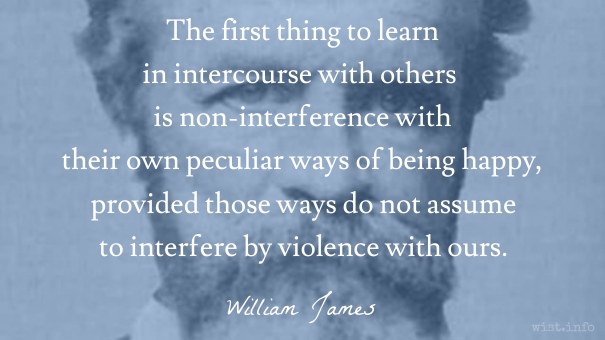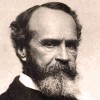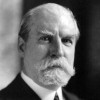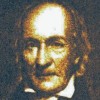The moral thing I wish to say to [future generations] is very simple. I should say love is wise, hatred is foolish. In this world which is getting more and more closely interconnected, we have to learn to tolerate each other. We have to learn to put up with the fact that some people say things that we don’t like. We can only live together in that way, and if we are to live together and not die together we must learn the kind of charity and kind of tolerance which is absolutely vital to the continuation of human life on this planet.
Bertrand Russell (1872-1970) English mathematician and philosopher
Interview by John Freeman, Face to Face, BBC TV (1959-03-04)
(Source)
Quotations about:
coexistence
Note not all quotations have been tagged, so Search may find additional quotes on this topic.
I should like to say that you have, through your knowledge, powers which humans have never had before. You can use these powers well or you can use them ill. You will use them well if you realize that humankind is all one family and that we can all be happy or we can all be miserable.
Bertrand Russell (1872-1970) English mathematician and philosopher
Interview by Woodrow Wyatt, BBC TV (1959)
Collected in Bertrand Russell's BBC Interviews (1959) [UK] and Bertrand Russell Speaks His Mind (1960) [US].
The condition of our survival in any but the meagerest existence is our willingness to accommodate ourselves to the conflicting interests of others, to learn to live in a social world.
Learned Hand (1872-1961) American jurist
“To Yale Law Graduates,” speech, Yale Law School (1931-06-07)
(Source)
Collected in The Spirit of Liberty (1953).
Though it might be nice to imagine there once was a time when man lived in harmony with nature, it’s not clear that he ever really did.
Elizabeth Kolbert (b. 1961) American journalist and author
The Sixth Extinction: An Unnatural History, ch. 11 (2014)
(Source)
Tolerance, I believe, will be imperative after the establishment of peace. It’s always useful to take a concrete instance: and I have been asking myself how I should behave if, after peace was signed, I met Germans who had been fighting against us. I shouldn’t try to love them: I shouldn’t feel inclined. They have broken a window in my little ugly flat for one thing, and they have done other things which I need not specify. But I shall try to tolerate them, because it is common-sense, because in the post-war world we shall have to live with Germans […] not for any lofty reason, but because it is the next thing that will have to be done.
E. M. Forster (1879-1970) English novelist, essayist, critic, librettist [Edward Morgan Forster]
“The Unsung Virtue of Tolerance,” radio broadcast, BBC (Jul 1941)
(Source)
Published as "Tolerance," Two Cheers for Democracy (1951).
If we have a decent sort of cat to begin with, and have always treated it courteously, and aren’t cursed with meddling, bullying natures, it’s a pleasure to let it do as it pleases. With children, this would be wicked and irresponsible, so raising children involves a lot of effort and friction. They need to be taught how to tie their shoes and multiply fractions, they need to be punished for pocketing candy in the grocery store, they need to be washed and combed and forced to clean up their rooms and say please and thank you.
A cat is our relief and our reward.
The world is very full of people — appallingly full; it has never been so full before — and they are all tumbling over each other. Most of these people one doesn’t know and some of them one doesn’t like; doesn’t like the colour of their skins, say, or the shapes of their noses, or the way they blow them or don’t blow them, or the way they talk, or their smell or their clothes, or their fondness for jazz or their dislike of jazz, and so on. Well, what is one to do?
There are two solutions. One of them is the Nazi solution. If you don’t like people, kill them, banish them, segregate them, and then strut up and down proclaiming that you are the salt of the earth.
The other way is much less thrilling, but it is on the whole the way of the democracies, and I prefer it. If you don’t like people, put up with them as well as you can. Don’t try to love them; you can’t, you’ll only strain yourself. But try to tolerate them. On the basis of that tolerance a civilised future may be built.
E. M. Forster (1879-1970) English novelist, essayist, critic, librettist [Edward Morgan Forster]
“The Unsung Virtue of Tolerance,” radio broadcast (Jul 1941)
(Source)
Published as "Tolerance," Two Cheers for Democracy (1951)
Tolerance is a very dull virtue. It is boring. Unlike love, it has always had a bad press. It is negative. It merely means putting up with people, being able to stand things. No one has ever written an ode to tolerance, or raised a statue to her. Yet this is the quality which will be most needed after the war. This is the sound state of mind which we are looking for. This is the only force which will enable different races and classes and interests to settle down together to the work of reconstruction.
E. M. Forster (1879-1970) English novelist, essayist, critic, librettist [Edward Morgan Forster]
“The Unsung Virtue of Tolerance,” radio broadcast (Jul 1941)
(Source)
Published as "Tolerance," Two Cheers for Democracy (1951)
Tolerance is not a moral absolute; it is a peace treaty.
Yonatan Zunger (b. 1977) American essayist, software engineer, physicist, ethicist
“Tolerance is not a moral precept” (2 Jun 2017)
(Source)
In regard to religion, mutual toleration in the different professions thereof is what all good and candid minds in all ages have ever practiced, and, both by precept and example, inculcated on mankind.
Samuel Adams (1722-1803) American revolutionary, statesman
“The Rights of the Colonists,” Report of the Committee of Correspondence to the Boston Town Meeting (1772-11-20)
(Source)
The first thing to learn in intercourse with others is non-interference with their own peculiar ways of being happy, provided those ways do not assume to interfere by violence with ours.
William James (1842-1910) American psychologist and philosopher
“What Makes a Life Significant,” Lecture, Harvard (1899)
Reprinted in Talks to Teachers on Psychology, Part 2, Lecture 3.
Peace and friendship with all mankind is our wisest policy, and I wish we may be permitted to pursue it. But the temper and folly of our enemies may not leave this in our choice.
Thomas Jefferson (1743-1826) American political philosopher, polymath, statesman, US President (1801-09)
Letter to C. W. F. Dumas (6 May 1786)
(Source)
I do not know many Negroes who are eager to be “accepted” by white people, still less to be loved by them; they, the blacks, simply don’t wish to be beaten over the head by the whites every instant of our brief passage on this planet. White people will have quite enough to do in learning how to accept and love themselves and each other, and when they have achieved this — which will not be tomorrow and may very well be never — the Negro problem will no longer exist, for it will no longer be needed.
You shall not hate in your heart anyone of your kin; you shall reprove your neighbor, or you will incur guilt yourself. You shall not take vengeance or bear a grudge against any of your people, but you shall love your neighbor as yourself: I am the Lord.
The Bible (The Old Testament) (14th - 2nd C BC) Judeo-Christian sacred scripture [Tanakh, Hebrew Bible], incl. the Apocrypha (Deuterocanonicals)
Leviticus 19:17-18 [NRSV (2021 ed.)]
(Source)
One of the components of the Greatest Commandments, as outlined by Christ; see Matthew 22:36-40. Alternate translations:
Thou shalt not hate thy brother in thine heart: thou shalt in any wise reason with thy neighbor, and not suffer sin upon him. Thou shalt not avenge, nor bear any grudge against the children of thy people, but thou shalt love thy neighbor as thyself: I am the Lord.
[KJV (1611)]
You must not bear hatred for your brother in your heart. You must openly tell him, your neighbor, of his offence; this way you will not take a sin upon yourself. You must not exact vengeance, nor must you bear a grudge against the children of your people. You must love your neighbor as yourself. I am Yahweh.
[JB (1966)]
Do not bear a grudge against others, but settle your differences with them, so that you will not commit a sin because of them. Do not take revenge on others or continue to hate them, but love your neighbors as you love yourself. I am the Lord.
[GNT (1976)]
You will not harbour hatred for your brother. You will reprove your fellow-countryman firmly and thus avoid burdening yourself with a sin. You will not exact vengeance on, or bear any sort of grudge against, the members of your race, but will love your neighbor as yourself. I am Yahweh.
[NJB (1985)]
You must not hate your fellow Israelite in your heart. Rebuke your fellow Israelite strongly, so you don’t become responsible for his sin. You must not take revenge nor hold a grudge against any of your people; instead, you must love your neighbor as yourself; I am the Lord.
[CEB (2011)]
You shall not hate your kinsfolk in your heart. Reprove your kin but incur no guilt on their account. You shall not take vengeance or bear a grudge against members of your people. Love your fellow [Israelite] as yourself: I am יהוה.
[RJPS (2023 ed.)]
The notion of a Christian commonwealth should be exploded forever. … Government should protect every man in thinking and speaking freely, and see that one does not abuse another. The liberty I contend for is more than toleration. The very idea of toleration is despicable; it supposes that some have a pre-eminence above the rest to grant indulgence, whereas all should be equally free, Jews, Turks, Pagans and Christians.
The wolf also shall dwell with the lamb, and the leopard shall lie down with the kid; and the calf and the young lion and the fatling together; and a little child shall lead them.
The Bible (The Old Testament) (14th - 2nd C BC) Judeo-Christian sacred scripture [Tanakh, Hebrew Bible], incl. the Apocrypha (Deuterocanonicals)
Isaiah 11:6 [KJV (1611)]
(Source)
Alternate translations:
Wolves and sheep will live together in peace,
and leopards will lie down with young goats.
Calves and lion cubs will feed together,
and little children will take care of them.
[GNT (1976)]
The wolf will live with the lamb, the panther lie down with the kid, calf, lion and fat-stock beast together, with a little boy to lead them.
[NJB (1985)]
The wolf shall dwell with the lamb,
The leopard lie down with the kid;
The calf, the beast of prey, and the fatling together,
With a little boy to herd them.
[JPS (1985)]
The wolf shall live with the lamb;
the leopard shall lie down with the kid;
the calf and the lion will feed together,
and a little child shall lead them.
[NRSV (1989 ed.)]
On the necessary points, unity. On the questionable points, liberty. In everything, love.
[In necessariis unites, in non necessariis libertas, in omnibus caritas.]
Rupertus Meldenius (1582-1651) German writer [pseud. of Peter Meiderlin]
Paraenesis Votiva pro Pace Ecclesiae ad Theologos Augustanae Confessionis [Votive Counsel for the Peace of the Church, to the Theologians of the Augustan Confession] (1626)
Also translated as "essentials" and "non-essentials."
Paraphrase of final lines of the work:
Verbo dicam: Si nos servaremus IN necesariis Unitatem, IN non-necessariis Libertatem, IN UTRISQUE Charitatem, optimo certe loco essent res nostrae.
[In a word, were we to observe unity in essentials, liberty in incidentals, and in all things charity, our affairs would be certainly in a most happy situation.]
Commonly attributed to St Augustine, but also to John Wesley, Richard Baxter, and several others.







